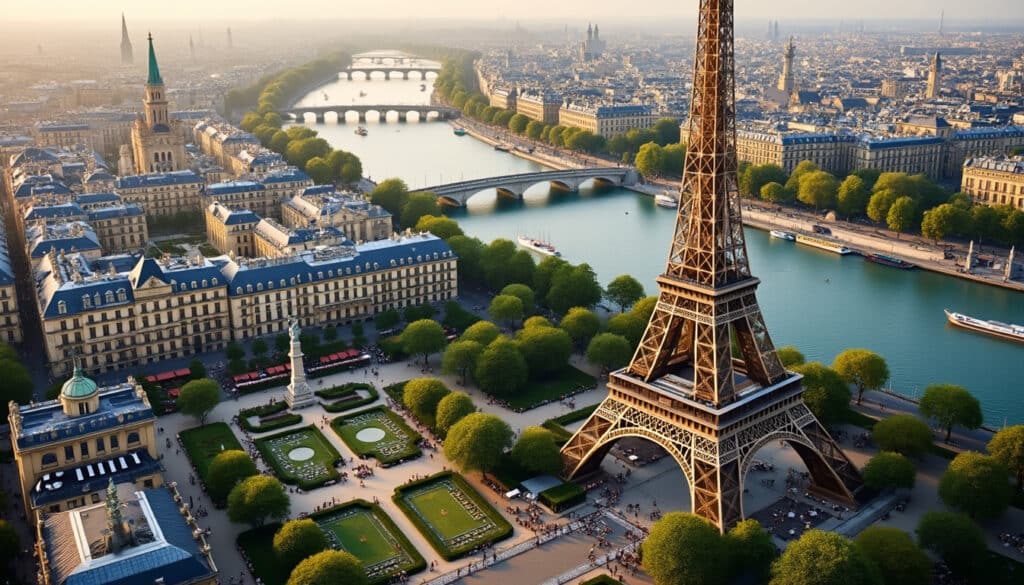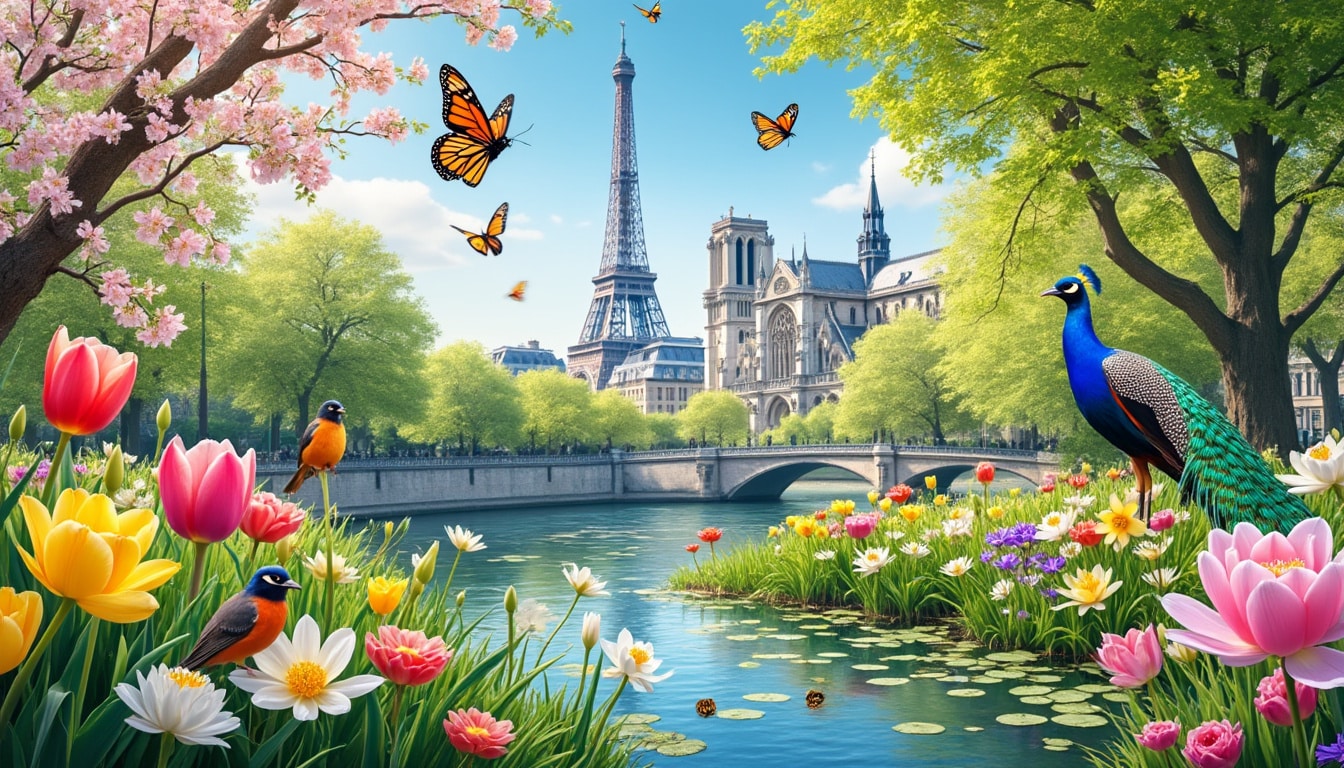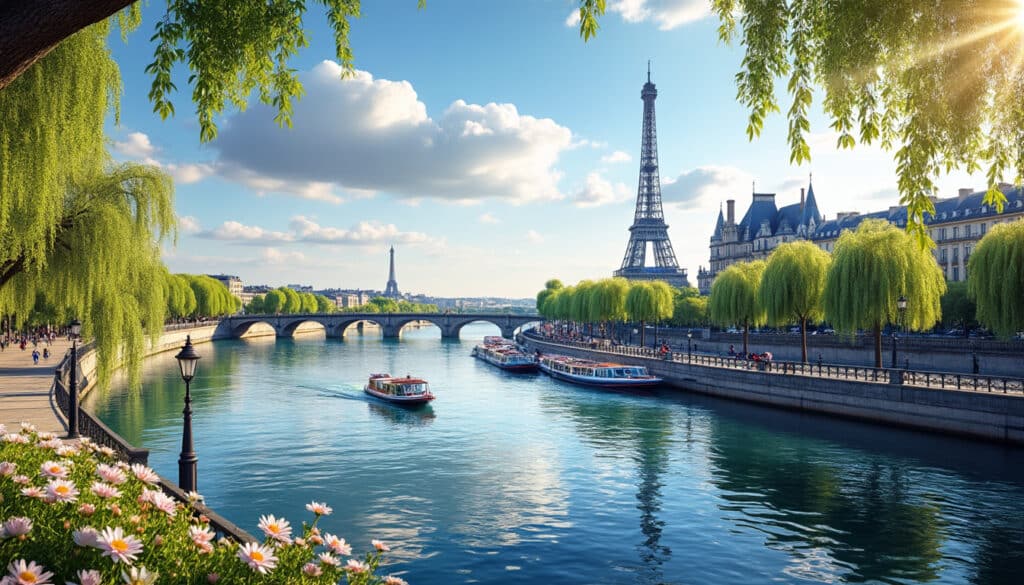Paris, the City of Light, is not just famous for its stunning architecture and exquisite gastronomy; it’s also home to a vibrant mosaic of parks and green spaces. These offer both residents and visitors a chance to escape the urban hustle and immerse themselves in the wonders of nature and wildlife. From lush city parks that breathe life into the historic avenues, to hidden gardens and nature trails, Paris presents a unique blend of natural serenity amidst its bustling streets. Discovering these green oases and their ecological treasures is an enriching experience for nature enthusiasts and casual strollers alike.
Exploring Paris’s Iconic City Parks
Paris boasts an impressive collection of over 400 parks and gardens, each with its own distinct charm. Among these, ten large city parks stand out as prime examples of why the city remains a focal point for environmental transformation and recreation. The gradual shift towards a greener Paris is evident in these sanctuaries, with spaces woven into the very fabric of urban life.
One notable destination is the Bois de Boulogne, a sprawling green expanse on the western edge of the city. This park is a haven for both locals and tourists, offering myriad activities. From rowing boats on its picturesque lakes to picnicking under the shade of its grand oaks, near-endless enjoyment can be found within its borders.
Parc Monceau, another beloved spot, captivates visitors with its English-style garden teeming with diverse FloraFaunaParis. Numerous statues and replicas of historical monuments complement the natural beauty, creating an outdoor museum of sorts.

For families and those with a penchant for contemporary art, the Parc de la Villette provides both play and cultural spaces. It combines wide lawns with modern art installations, inviting visitors to contemplate art while enjoying a NatureWalk amidst its avant-garde landscape.
The Importance of Promenade Plantée
The Promenade Plantée—Paris’s elevated linear park—offers a unique UrbanHike experience unmatched in the city. Beyond serving as a peaceful retreat, it stands as an ecological corridor, safeguarding biodiversity within its FloraFaunaParis as it winds from the Bastille through the 12th arrondissement.
This linear green belt is a perfect example of balance between urban design and nature conservation, bridging the gap between city life and green living. Spanning over 4.7 kilometers, visitors can observe ParisGreen initiatives blossoming through native plant species and dedicated WildlifeWatch efforts to preserve existing habitats.
Wildlife and Flora in the Heart of Paris
Despite its densely populated landscape, Paris serves as a habitat for a diverse array of wildlife. Observers of the city’s fauna are often surprised by the variety of species coexisting within such an urban environment. Birds, insects, and small mammals have found niches within the metropolitan tapestry, thriving in pockets of nature seeded by EcoParis initiatives.
Birdwatching is particularly rewarding in Paris, with species such as the melodious European robin and the stunning Eurasian blue tit commonly spotted in parks and gardens. NatureReservesParis such as those within Bois de Vincennes provide sanctuaries for birds, where ornithologists and amateur birdwatchers alike gather, binoculars in hand, to witness their seasonal migrations.
Moreover, Paris is home to various ecosystem-restoration efforts aimed at revitalizing urban wildlife populations. Collaborations between city officials and non-profit organizations have resulted in a multitude of EcoToursParis designed to educate the public and provide insights into the city’s ecological strategies.
Hidden Wildlife Gems: Coulée Verte René-Dumont
The Coulée Verte René-Dumont, often compared to the High Line in New York City, is a beloved elevated parkway that runs through eastern Paris. This unlikely urban adventure spot offers a mesmerizing amalgamation of pedestrian pathways, lush shrubbery, and delightful vistas of Parisian rooftops.
Walking along this 4.5-kilometer path reveals surprising vignettes of urban flora and fauna, effectively bridging the gap between bustling city life and serene nature. One can witness WildParis blooming along its walkways, a testament to the city’s commitment to sustainability and nature preservation.
The Role of Parisian Gardens in Environmental Sustainability
Parisian gardens have long played a critical role in promoting environmental sustainability within the urban environment. Exemplifying this effort are many community-led initiatives that foster biodiversity and foster a deeper connection with nature among residents. Gardens such as Les Jardins du Luxembourg have become key players in the city’s green transformation.
Through community gardening projects, Parisians embrace sustainable practices, using methods like composting and permaculture to nurture both plant and human communities. These endeavors are critical in forming EcoToursParis networks that educate on sustainable practices and inspire greener futures.
| 🌿 Garden | 🌺 Key Features | 📍 Location |
|---|---|---|
| Les Jardins du Luxembourg | Botanical collection, beekeeping | 6th arrondissement |
| Parc des Buttes-Chaumont | Landscaped cliffs, grotto | 19th arrondissement |
| Jardin des Plantes | France’s biggest botanical garden | 5th arrondissement |
These oases are not merely decorative; they act as vital growth nodes that maintain EcoParis’s sustainability targets. Educational workshops and guided tours bring into focus the intricate balance between historical elegance and ecological advancement.
Community-Driven Urban Agriculture
The growth of urban agriculture projects throughout Paris further exemplifies the active role gardens play in ensuring a sustainable future. This trend towards self-sustainability sees ParisianNature projects flourishing across city rooftops and underutilized plots, combating food insecurity and promoting green living.
Excursions Beyond the City: Nature Reserves near Paris
For those yearning for more expansive nature excursions, the surrounding region of Paris offers several idyllic nature reserves. These sites provide an escape from the city where adventurers can engage more directly with sprawling landscapes and reinvigorate their spirits.
A prime destination is the Haute Vallée de Chevreuse, a verdant parkland located in the Yvelines department. Hiking trails traverse plains and woodland, offering unparalleled opportunities for NatureWalks and encounters with native wildlife.
Moreover, the Forêt de Fontainebleau is famed for its opportunities of rock climbing, attracting both seasoned climbers and novice thrill-seekers alike. This natural playground offers manicured trails and unspoiled vistas, reminding visitors of the natural wonders Paris has right on its doorstep.
| 🏞️ Reserve | 🚶 Activities | 🌍 Distance from Paris |
|---|---|---|
| Haute Vallée de Chevreuse | Hiking, birdwatching | 30 km |
| Forêt de Fontainebleau | Rock climbing, cycling | 60 km |
| La Défense Arena Park | Nature walks, photography | 10 km |
These greeneries not only offer recreation but play a vital role in biodiversity conservation, serving as sanctuaries for varied species. EcoToursParis provides guided excursions that highlight the crucial intersection of nature and sustainability, rendering these places essential components of the city’s ecological framework.
Paris Green Belt: The Future of Urban Renewal
The Paris Metropolitan region’s ecological vision includes ambitious plans for expanding its green belt, ensuring connectivity between urban parks and rural nature. ParisGreen initiatives aim to reduce carbon footprints while enhancing quality of life. This living natural boundary is an inspiring example for global cities committing to environmental excellence.
Ultimately, Paris’s dedication to integrating nature and wildlife into its urban environment not only enriches its aesthetic appeal but also enhances the health and wellbeing of its inhabitants. These spaces are testaments to the harmony possible between modernity and nature, promising a green legacy for future generations.
FAQ About Nature and Wildlife in Paris
- 🌿 What is the best time to visit Paris’s parks? The best time is Spring (April – June), when flowers bloom and temperatures are mild.
- 🌼 Are there guided tours available in Parisian parks? Yes, EcoToursParis offers guided tours focusing on ecology and history.
- 🌳 Can you see wildlife in the heart of Paris? Absolutely! Many parks are home to diverse birdlife and small urban wildlife.
- 🌺 How do I participate in community garden projects? Many districts have local programs; check with community centers or municipal sites.
- 🚶 Are nature reserves near Paris accessible by public transportation? Yes, most are reachable by regional trains or buses.
Experience the intertwining of Parisian culture with the enchantment of nature by exploring its parks, reserves, and green initiatives. Whether you’re strolling through its iconic gardens or embarking on an UrbanHike, the nature and wildlife of Paris promise a vibrant, refreshing retreat from the hustle and bustle of city life.

When one thinks of Paris, visions of the iconic Eiffel Tower, charming street cafés, and exquisite cuisine might instantly come to mind. Yet, beneath its cultural richness lies a fertile tapestry of landscapes that intricately shape this vibrant metropolis. From…

Geographical features of Paris
Paris, the “City of Light,” is not only known for its iconic landmarks and vibrant culture but also for its remarkable geographical features. From its strategic location on the River Seine to the charming islands within its heart, Paris offers…

Location and coordinates of Paris
Paris, known for its unparalleled beauty and rich history, is a city that captures the imagination of millions around the world. From iconic landmarks like the Eiffel Tower to charming cobbled streets and vibrant art scenes, Paris is a destination…


